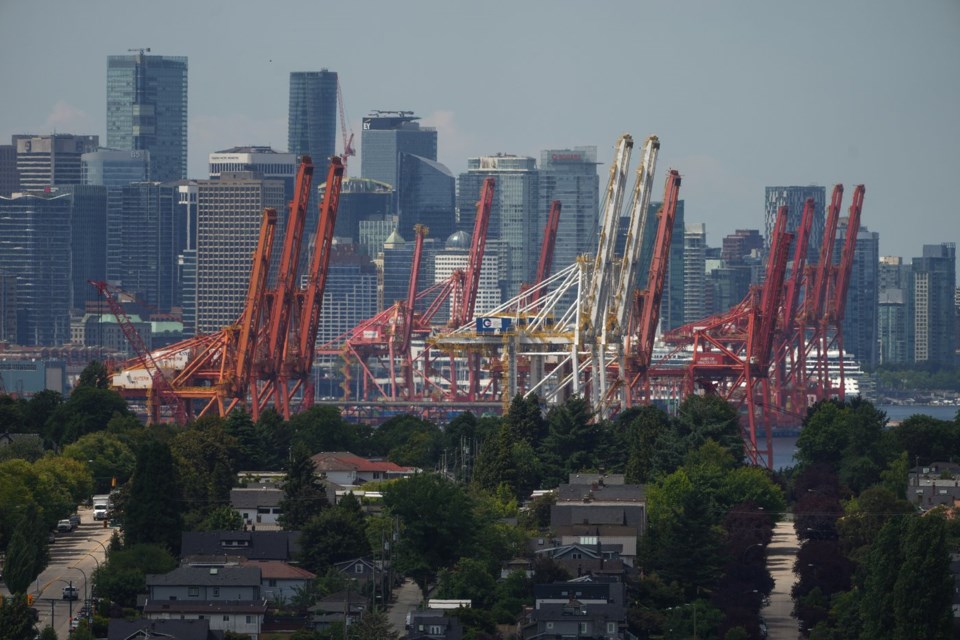VANCOUVER — The right of workers to strike and employers to lock them out should be preserved for the longshore industry in Canada, say labour experts tasked with studying the 2023 British Columbia port strike that froze trade worth billions for almost two weeks.
Vince Ready and Amanda Rogers say laws should be changed to allow a special mediator to be brought in during disputes, and workers should formalize negotiating collectively rather than allowing a union to have separate conversations with each operator.
Those are among seven recommendations made to the labour minister in a report released publicly this week.
Thousands of workers went on a 13-day strike in July, 2023, freezing cargo movement at some of the country's busiest ports.
The Industrial Inquiry Commission was appointed to make the report by the federal government after the strike. Many business groups called for port work to be made an essential service in the wake of the industrial turmoil.
But the report concludes an essential-services model cannot work in the longshore industry without "severely undermining collective bargaining right."
"There is no question that the level of acrimony between the parties has heightened tensions and polarized opinions on how to restore a sense of stability and predictability to labour relations in B.C. ports," the report says.
"However, in the commission's view, limiting or removing the right to strike is unlikely to achieve labour relations stability in B.C. ports and denying the parties a legal right to strike or lockout would do more harm than good, potentially fuelling illegal and unpredictable work stoppages."
The report recommends the federal government enact legislation for what it calls a "special mediator process" similar to what already exists in B.C. labour law.
The report suggests the mediator would be brought in if parties remain unable to resolve their dispute, and write a comprehensive report on the key issues and what can be done about them.
"This means the government would be able to rely on the special mediator's expert opinion about negotiations and the likelihood that the parties can reach a deal," the report says.
"The added benefit of this approach is that, even if the report is not accepted by the parties, a special mediator's recommendations can still advance negotiations by providing a basis for continued bargaining."
During the period in which the special mediator is active, and for 10 days after a report is complete, both parties would be prohibited from issuing strike or lockout notice.
McGill University labour expert Barry Eidlin, who was among those consulted for the report, said in an interview that having the option to bring in a mediator would be an improvement over the minister forcing an end to job action using the Canada Labour Code.
"It just totally removes the employer's incentive to come to the bargaining table if they know that if they hang on long enough that they're going to order the workers back to work," he said.
While it remains to be seen if the recommendations will be implemented, Eidlin said he was heartened to see a strong defence of the right to strike.
"In the heat of the conflict this was really the hue and cry from employer groups about declaring these workers essential and being able to order them back to work," he said.
"And there's a very good discussion in the report of the way that that kind of approach has actually amplified the problem that has led to the creation of this report."
In a statement online, Minister of Jobs and Families Patty Hajdu thanked the commission for its work.
"I am hopeful this report will provide a path forward that fosters growth and prosperity for the West Coast ports," she said.
The B.C. Maritime Employers Association says in a statement that the recommendations in the report are "thorough, balanced, and provide a clear path forward for the federal government, the BCMEA and the International Longshore and Warehouse Union."
"As Canada urgently pivots to new, more reliable trading partners and builds a single Canadian economy, our competitiveness and economic success hinge on the reliability and long-term stability of our West Coast ports," the statement says.
A statement from CEO of the Greater Vancouver Board of Trade Bridgitte Anderson says the recommendations "must be implemented without delay."
"With only 17 months until the next round of bargaining, Canada cannot afford a repeat of the chaos that businesses and workers experienced. Particularly in the face of increased trade hostility from our southern neighbours," Anderson says.
The International Longshore and Warehouse Union Canada did not immediately respond to a request for comment.
This report by The Canadian Press was first published June 13, 2025
Ashley Joannou, The Canadian Press



